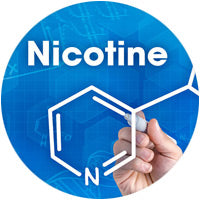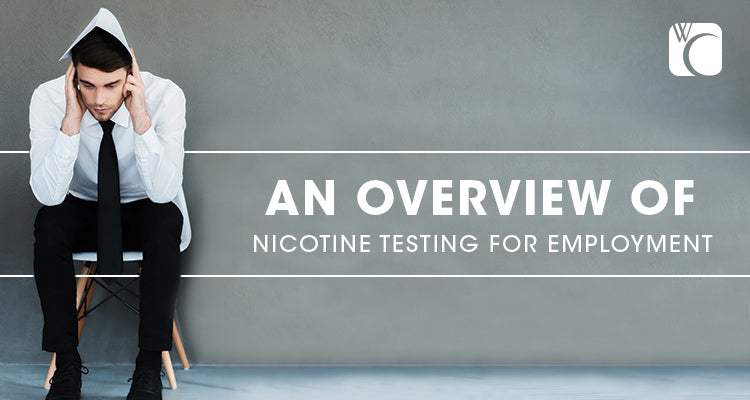If you’re a vaper on the job hunt, you may be worried about how tobacco-free workplace policies may affect your career prospects. In many US states, employers are legally allowed to implement no-hire policies for nicotine users by using nicotine testing for employment. There are several methods of testing for nicotine; however, the best way to detect tobacco use is through a cotinine test.
Cotinine is a metabolite of nicotine, which means that it can be detected long after someone uses nicotine. While some companies refuse to hire nicotine users to avoid paying higher health insurance premiums and to promote a health-positive public image, new research suggests that nicotine may not only be less harmful than once believed, but could actually have medicinal applications.
Nonetheless, since the liquid used in electronic cigarettes contains nicotine, vapers are currently vulnerable to job discrimination even if they do not use tobacco. The length of time it takes for nicotine and cotinine to clear the body varies based on several factors, so we’ll go over the basics of nicotine testing below.
How Long Does Nicotine Stay in Your System?

Nicotine is a stimulant found in tobacco that can be absorbed into the body by smoking, direct skin contact and through membranes in the nose and mouth. The amount of time nicotine stays in your body varies depending on amount of usage and the type of nicotine delivery system used.
The average amount of time nicotine remains in your system is only about 2-11 hours after use. As nicotine is absorbed into the body, it is broken down into cotinine. Cotinine is a metabolite of nicotine that remains in your saliva, urine, blood and hair for a longer period of time. The metabolization process can be affected by a number of factors, including genetics, age, diet and medication regimens. The period of time cotinine is detectable in your system also depends on the type of test being used.
Related: What Are the Effects of Nicotine Withdrawal?
What Methods Are Used for Nicotine Testing?
There are four different methods used for nicotine testing:
- Nicotine detection in blood samples: Blood testing for nicotine is used to tell whether a person has recently used nicotine, and how much nicotine was consumed. A blood test can detect both nicotine and cotinine, making it the most accurate method of testing.
- Nicotine detection in urine samples: Urine tests are less invasive than blood tests and are cheap and easy to administer. They are more commonly used to detect the presence of nicotine and cotinine for employment.
- Nicotine detection in saliva samples: Testing for nicotine usage through saliva is the most sensitive method for detecting cotinine. It can also be used to measure the amount of nicotine usage.
- Nicotine detection in hair samples: Nicotine and cotinine testing using hair follicles is the most reliable method. It is also the most expensive, and is only used when other forms of testing are unsatisfactory.
When performing a nicotine testing screen for a new job, employers may ask for a small sample of blood or hair to be sent to a lab for cotinine testing. Most saliva and urine tests are done on the spot, with the results returned within minutes.
Related: Where Does Nicotine Come From?
Why is Nicotine Testing Used for Employment?

Enforcing rules against nicotine usage after someone has already been hired is challenging. Attempts to pry into what employees do outside of their job can be seen as an invasion of personal privacy, which even non-smokers tend to dislike. Nearly half of the US states are legally allowed to test for and deny employment to nicotine users.
Check out the map below to see which states do and do not allow nicotine testing for employment:

How Long Does it Take Nicotine to Leave Your System?
While nicotine generally leaves the system within a few days after you stop using tobacco, both nicotine and cotinine can be detected in hair follicles for up to 3 months on average. This amount can increase to up to one year in heavy smokers. Due to the cost of hair testing for nicotine, employers rarely use this method of testing. Saliva tests, on the other hand, can detect cotinine for up to four days after nicotine consumption. These tests are most commonly used by employers as they are cheap and easy to do and can be administered on the spot.
How Long Does Nicotine Stay in Your Blood?

Nicotine is quickly absorbed into the bloodstream within 10 seconds after entering the body. The level of nicotine absorbed into the bloodstream can rise very quickly while smoking, and peaks upon completion. Nicotine levels in the bloodstream rapidly decline after tobacco use, and can be detected in a blood test for 1-3 days after consumption. Once nicotine reaches the liver, it begins to metabolize into cotinine, which can remain present in the bloodstream for up to 10 days after nicotine usage.
How Long Does Nicotine Stay in Your Urine?

The presence of nicotine in urine can usually be detected within 2-4 days after cessation. Cotinine levels, on the other hand, can remain present in urine for up to 2 weeks in regular nicotine users and for up to 3 weeks or longer in heavy nicotine users. For menthol cigarette smokers, cotinine levels in urine may linger for a longer period of time. If you are anticipating a nicotine or cotinine test and want to make sure that it comes up negative, you can expedite the elimination process by drinking a lot of water, eating foods with antioxidants and exercising daily.
Related: What Does Nicotine Do to the Body?
Is All Nicotine Bad for You?

While job discrimination against smokers remains controversial, it’s understandable why healthcare employers in particular wouldn’t want their employees smoking cigarettes. However, is there any justification for discriminating against people who use other nicotine products like e-cigs? Although nicotine is a stimulant, continued evidence suggests it may not be responsible for the myriad of health problems associated with smoking.
While evidence has proven that smoke, tobacco and the other chemicals in cigarettes can cause cancer and other diseases, it has also suggested that nicotine by itself is as harmless as coffee. However, since nicotine and caffeine are both stimulants, they should be used in moderation to prevent any unpleasant side effects of over-stimulation. With that said, scientists have also discovered that nicotine could have therapeutic benefits as it has been used in clinical studies to successfully treat neurological disorders such as ADHD, Schizophrenia, Parkinson’s disease and Alzheimer’s.
Related: The Truth About Nicotine
Nonetheless, vapers can still fall victim to unfair hiring practices directed at smokers, so as we wait for laws and hiring policies to evolve, you at least now know what to expect when looking for a job in a field with no-hire policies for nicotine users.








